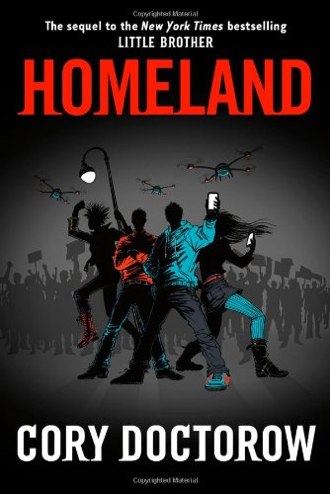Homeland
In Little Brother, Marcus Yallow’s high school world got blown apart when someone blew up the Bay Bridge. The panic was bad but the government response was worse, as the government used terrorism as an excuse to impose martial law. That crisis was resolved, thanks to Marcus’s clever hacking, but the Lesser Depression has gotten worse and worse and the government is still eager to use the Internet (and a healthy dose of torture) to control a docile populace. This sets the stage for Homeland.
Doctorow’s entry in Clute’s commendable Science Fiction Encyclopedia is, I think, exactly right: Doctorow is a thinker who uses fiction to explain an argument that mixes technology and politics. This has not been a formula for success lately, though of course it once worked well enough for Hugo and Zola and Shaw, for Dreiser and Sinclair Lewis. But it seems to me that Victor Hugo is the closest match to Doctorow’s aspiration; these are books of ideas first, with some dramatic tension to leaven the dough.
There’s plenty of leavening, and also plenty of info dumps. We learn a lot about police tactics, 3D printers, Burning Man etiquette. We learn how Occupy does public speaking without a microphone and how to manage a political site.
One thing we don’t learn much about is Marcus’s callow, feckless parents. Mom and Dad are useless. The parents of Marcus’s remaining school friends are no better; though his girlfriend’s parents are cool about his spending the night now and then, none of them does much about the government surveillance, harassment, and torture of their kids, and none of them takes much interest in finding a job for themselves or their grown children. Marcus does make a point of cooking nice family dinners to restore a sense of normality to the house, but his parents simply make appreciative noises. These kids grow up early. So does Katniss Everdeen, to be sure, but Katniss knows it’s wrong and it makes her sad and angry and she thinks about it all the time. To Marcus, absent parents are just the new normal.
Canadian-born Doctorow now lives in England, and his campaign subplot makes more sense for the UK than it does for the US. The story is set in a near-future that is even more recognizable than the terrorism-battered San Francisco of Little Brother. Our hero, Marcus Yallow, is now webmaster for a charismatic politician running an independent campaign for the US Senate.
This candidate is clearly a progressive, but deplores the Democrats’ support for drones and detention and bankers. The Republicans are “just as bad.” This is arrant nonsense. First, the Republicans aren’t merely just as bad; they’re just as bad on these issues and they’re insane on many others, Doctorow forces his would-be Senator into false equivalence of the worst sort. The candidate worries about being forced by party discipline to vote against his conscience, but everyone knows that the Democrats have no party discipline. The candidate is running for the Senate: how does he propose to work in the senate? Of course he’s going to caucus with the Democrats.
When was the last time a Democratic senator was really hurt badly for going off the reservation? Remember: this is the party that held Hubert Humphrey and Theodore Bilbo together. Someday someone will pull off the trick that Lincoln did in 1860 and replace one of the current parties with a new one, but that’s not going to happen in a California senate race and, if it were to happen in the near future, the obvious candidate to play the role of the Whig Party is the GOP. This independent candidacy could make sense in Parliament; in the US, it’s a silly fantasy, and it feeds the right-wing propaganda that always blames the Democrats for Republican intransigence.
Doctorow will keynote Web Science 13 this Thursday May 2, in Paris.
